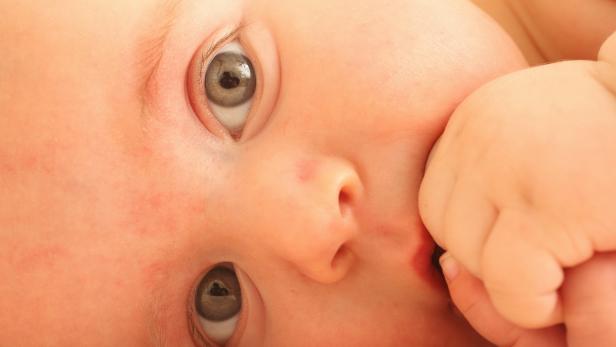Gut Health Linked to the Development of Eczema in Babies, Study Finds
Could gut health be the clue to healing your baby’s skin?


Aitor Diago
It’s estimated that one in 10 children have eczema, also called atopic dermatitis. While some kids will outgrow this skin condition, others will not and it often worsens with age. To manage their baby’s dry, red, and itchy skin, parents will change up their baby’s bath time routine, use a variety of different topical creams, and try eliminating anything that could trigger a flare up. However, a new study suggests that to ease the discomfort of eczema in babies, pediatricians should look at their gut health first.
According to a study published in the journal of the American Society for Microbiology, researchers at the Chinese University of Hong Kong say there is a link between the gut microbiome of infants with eczema and babies who do not have this skin condition.
For this study, researchers surveyed a group of pregnant women about their diet and lifestyle. After the women delivered their babies, researchers collected medication, diet, and health information on 112 infants.
For the next three years, the researchers monitored if any of the children developed eczema issues and studied information from the baby's gut microbiome by collecting nine stool samples. They found that at 6 and 12 months of age 43% of the male babies and 30% of female infants had physician diagnosed eczema, with most cases being reported as mild or moderate.
When the scientists analyzed the microbiomes of these babies, they found a clear difference in the gut health of the babies with eczema and the babies who did not have eczema.
"The problem of eczema is increasing, and our study shows it could be a result of unwanted changes in the gut bacterial content," said Dr. Paul Chan, a professor of microbiology at the Chinese University of Hong Kong and principal investigator of the study, "The first year of life could be a critical period to restore the gut bacteria to a more desirable composition."
Researchers say there were a variety of factors that affected the gut health of the babies with eczema: how the baby was delivered, what antibiotics they are given during labor, and how they are fed.
Interestingly, researchers say they found certain changes in an infant’s gut microbiome right before they were diagnosed with eczema, like a lack of a species of bacteria called bacteroides and too much of another type of bacteria called Clostridium sensu stricto.
So, what does this information mean for parents? First, researchers are hopeful this study will be replicated in different parts of the country so that different lifestyles and diets can be studied.
Also, researchers in the study say they hope pediatricians can use the information to give parents updated advice. For instance, during the study, researchers also reported babies delivered via C-section had an increased risk of eczema. This could mean that doctors prescribe different antibiotics for c-section babies to prevent the wrong kinds of bacteria from growing in their guts.
Up next, the team of researchers say they plan to carry out further studies to learn if early microbiome-based treatments could help prevent eczema developing in children!
YOU MIGHT ALSO LIKE:















